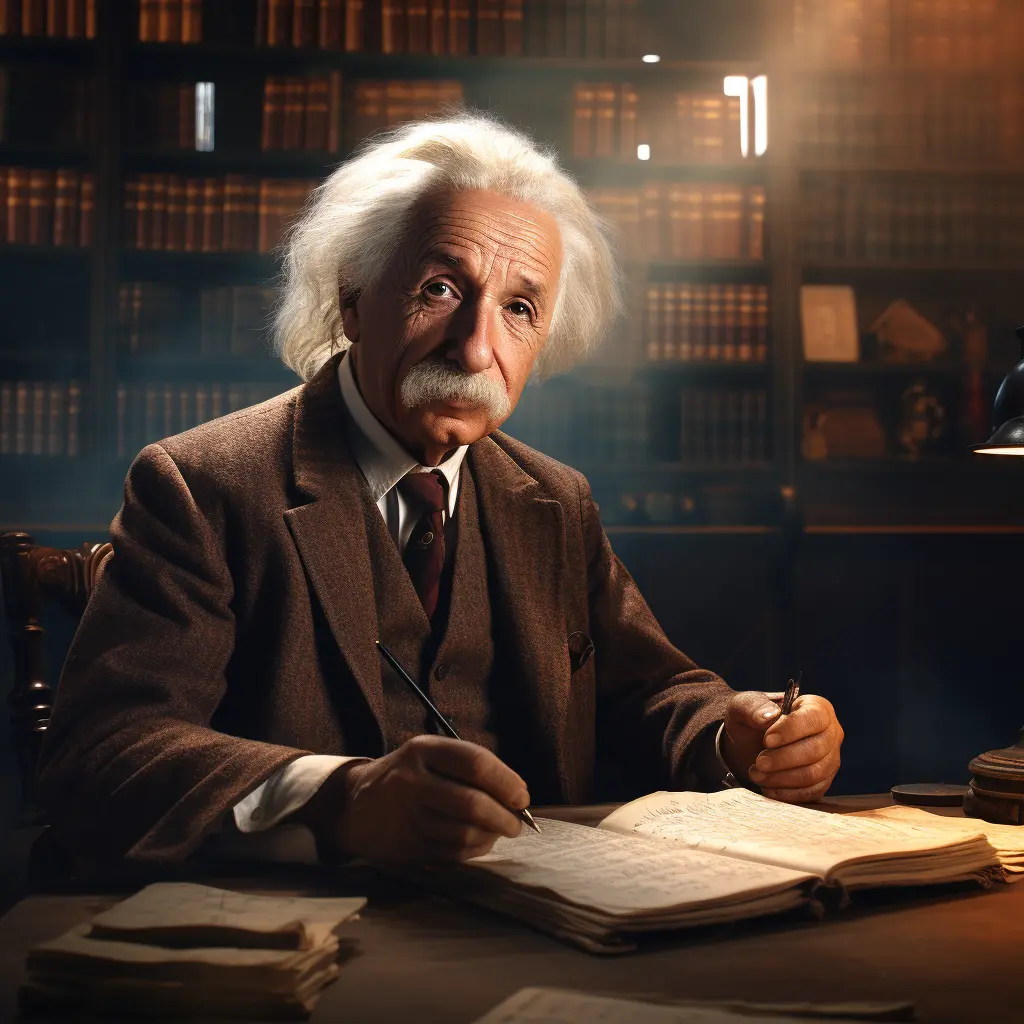
Introduction
Born in Germany in 1879, Albert Einstein is best known for his special and general theories of relativity, revolutionizing the understanding of space, time, and gravity. Einstein, a theoretical physicist, made profound contributions to the field of theoretical physics, even outside the realm of relativity. He won the 1921 Nobel Prize in Physics for his work in theoretical physics, particularly for his discovery of the law of the photoelectric effect. A notable polymath, he was outspoken in several areas, including pacifism, education, Zionism, and civil rights. Einstein emigrated to the United States in 1933, escaping the rise of the Nazi regime.
Recognized globally as a physics prodigy, Einstein spent most of his life in Germany and Switzerland where his native language, German, was predominantly spoken. However, his linguistic capabilities extended beyond German, encompassing English as well, which played a significant role in his research, teaching, and international communication.
Einstein’s Origin and Early Life
Einstein’s birth and upbringing in Germany
Born in Ulm, Kingdom of Württemberg in the German Empire, on March 14, 1879, Albert Einstein grew up in an ashkenazi jewish household that spoke Hochdeutsch, or High German. His formative years were spent in Munich, where his family ran an electrochemical factory. As a student, he attended a Catholic public primary school and later, a secondary school named Luitpold Gymnasium, followed by the Swiss Federal Institute of Technology in Zurich. Though his primary language was German, through his education and extensive love of reading, he became exposed to different languages, including English. However, it wasn’t until his later years that he would attain fluency in English after his move to the United States. Thus, while native German-speaking, his upbringing planted seeds for his eventual bilingualism.
Einstein’s education in the German language
He is considered one of the most brilliant minds in history, was born and raised in Germany, making German his native language. He attended Luitpold Gymnasium in Munich, where the medium of instruction was in German. Education in Germany during the late 19th century focused heavily on linguistics, which would have had a significant influence on Einstein’s language acquisition. Young Albert showed early signs of genius which reflected in the way he mastered the language. Apart from German, he also picked up Latin and Greek due to curricular requirements. His affinity for languages was notable, as he believed that language was the framework in which we shape and express our thoughts. So, while German was his mother tongue, Einstein’s language skills extended beyond just his native language.
Einstein’s Scientific Career
Impact of the German language on his career
Despite being a native German speaker, he made significant contributions to the international scientific community that went far beyond language barriers. However, his command of the German language had a substantial influence on his scientific career. The bulk of his breakthrough theories and groundbreaking papers were initially written and published in his mother tongue. This preeminence of the German language within the scientific community during the early 20th century, particularly in the field of physics, strengthened Einstein’s impact and prominence. Additionally, his understanding of different languages, specifically English, allowed him to communicate and share his phenomenal ideas with other prominent physicists globally, thus elevating his status in the scientific world. His ability to traverse linguistic barriers amplified the reach and significance of his theories, resonating with academicians, scientists, and intellectuals worldwide, extending the impact of his career.
The Influence of English language in his scientific papers
In Albert Einstein’s impressive line of work, English played a substantial role, particularly in his scientific writings. Although he wrote many of his earlier papers in German, his primary language, the later phase of his career saw vast contributions made in English. This shift was dictated in part by his emigration to the United States in 1933, following the rise of the Nazis. Finding himself in a predominantly English-speaking scientific community, his documents, correspondence, and drafts often showcased his acquired ability to articulate complex theories in English. Moreover, his English proficiency enabled a broader, international audience to access and comprehend his groundbreaking work in physics. Thus, Einstein’s engagement with the English language facilitated not only his personal scientific discourse but also evolved global conversations within the scientific community about revolutionary theories like relativity.
Albert Einstein’s Relationship with the English Language
Einstein’s acquisition of English language skills
The eminent physicist, although born and raised in Germany, did indeed learn and become proficient in the English language. He acquired English later in life, primarily as a necessity when he relocated to the United States in 1933, escaping Nazi rule. Prior to his move, he had been visiting the U.S. quite frequently for lectures and tours and was surrounded by English-speaking colleagues. Various historical accounts suggest that he was able to handle complex discussions and debates in English, even if it wasn’t his forte. On moving to the U.S., he took up a position at the prestigious Institute for Advanced Study in Princeton, New Jersey, where using English became a part of his daily life. His letters, papers, and public addresses from this period showcase his ability to communicate effectively in English, albeit with a marked German accent. Despite the challenges of learning a new language as an adult, Einstein’s intellectual prowess aided him in grasping English well enough to foster effective communication in both his professional and personal lives.
Related: Did Hitler Speak English?
Did Albert Einstein speak fluent English?
Albert Einstein, a physicist of German origin, did speak English, although it was not his first language and he was not entirely fluent. He was born and raised in Germany and moved to the U.S in the late 1930s, escaping the political turmoil of his homeland. Einstein developed his basic proficiency in English during his time at the Swiss Polytechnic Institute where he had studied. However, most of his significant scientific work is documented either in German or it was translated from German to English by others. Once Einstein moved to America, he continued to improve his English proficiency, allowing him to communicate effectively with other scientists, students, and the public. However, he relied on others for written correspondence in English to help him avoid any possible confusion or misunderstanding. Einstein’s speeches were often written with the assistance of others to ensure language accuracy. Although he became adept at conversing in English, his distinctive German accent remained and he often reverted to his native language to articulate complex scientific theory. Thus, while Einstein did speak English, his fluency was not on par with a native speaker, and he preferred to rely on German when discussing more sophisticated topics.
Perception and Impact of Albert Einstein’s English Language Proficiency
How other scholars and physicists perceived Einstein’s English
Throughout the global scientific community, Albert Einstein’s proficiency in English was viewed with notable admiration and respect. Despite being a native German speaker, Einstein’s command over English was regarded as strikingly precise and competent. Einstein moved to the United States in his later years and continued his scientific pursuits in English, inspiring a generation of physicists with not just his groundbreaking theories but also his language skills. Notably, some scholars observed that Einstein’s accent and vocabulary in English demonstrated his multi-cultural intellect and analytical mind. Renowned physicists like Niels Bohr and Max Planck were reportedly amazed by how Einstein could seamlessly translate complex scientific ideas into English, fostering an improved cross-cultural scientific dialogue. Einstein’s English proficiency greatly influenced academia, enabling more comprehensive and inclusive scientific discussions. His documented correspondence with other eminent physicists and scholars remains a testament to Einstein’s aptitude for English, which became instrumental in broadening the reach and understanding of his revolutionary theories. Overall, the scientific community widely acknowledged and appreciated Einstein’s grasp of English, underscoring his truly international status as a scholar.
Einstein’s public speeches and interviews in English
The eminent physicist who was synonymous with intelligence, Albert Einstein, did indeed master English communication. Although Einstein’s native language was German, he learned English after moving to the United States in the 1933. His public speeches and interviews were generally conducted in English, as it was the primary language of Einstein’s new residence. Despite an initial heavy accent and his own admission of struggling with the nuances of English, he became proficient enough to share his groundbreaking ideas and theories with a global audience. The impact of Einstein’s English language proficiency was profound. It allowed him to interact directly with the international scientific community and the public at large, thereby amplifying the reach of his scientific concepts and philosophical musings. Although his linguistic transition might have posed initial challenges, the determination to cross the language barrier had lifetime rewards. It allowed Einstein to elevate his strong pacifist and humanitarian beliefs, in addition to his scientific theories, onto a world stage.
Conclusion
Recap: Did Albert Einstein speak English?
To conclude, yes, Albert Einstein could indeed converse in English. Despite German being his native language, he acquired English during his years in the United States. However, he had a noticeable accent and was more comfortable expressing complex theories and concepts in German.


